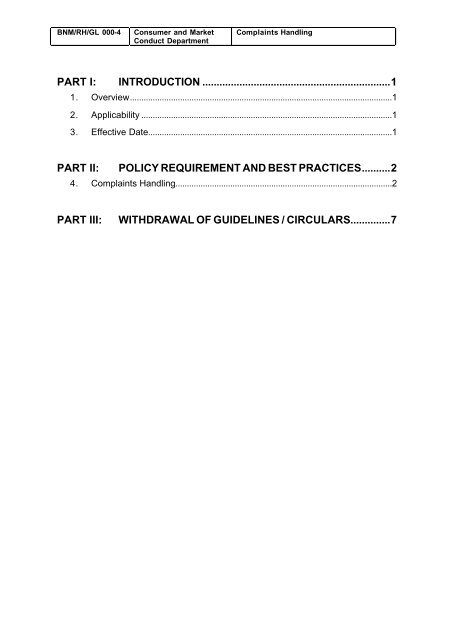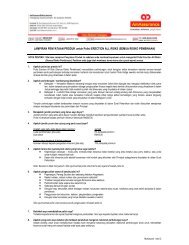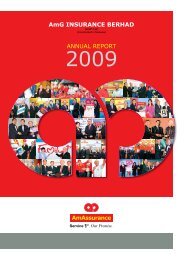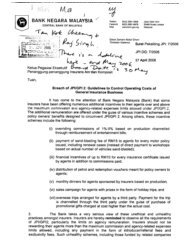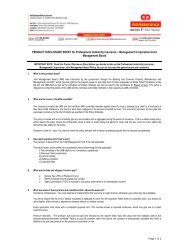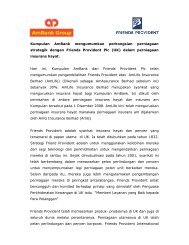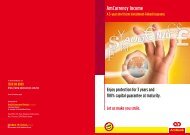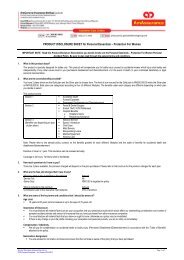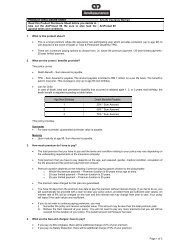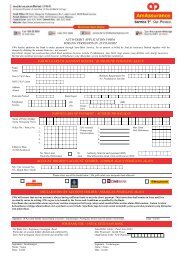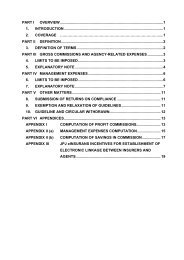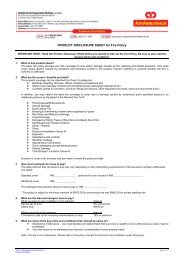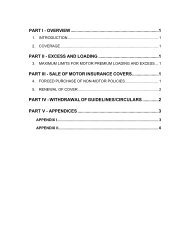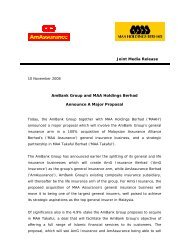BNM/RH/GL 000-4 - AmAssurance
BNM/RH/GL 000-4 - AmAssurance
BNM/RH/GL 000-4 - AmAssurance
Create successful ePaper yourself
Turn your PDF publications into a flip-book with our unique Google optimized e-Paper software.
<strong>BNM</strong>/<strong>RH</strong>/<strong>GL</strong> <strong>000</strong>-4Consumer and MarketConduct DepartmentComplaints HandlingPART I: INTRODUCTION ..................................................................11. Overview...................................................................................................................12. Applicability ..............................................................................................................13. Effective Date...........................................................................................................1PART II:POLICY REQUIREMENT AND BEST PRACTICES..........24. Complaints Handling...............................................................................................2PART III:WITHDRAWAL OF GUIDELINES / CIRCULARS..............7
<strong>BNM</strong>/<strong>RH</strong>/<strong>GL</strong> <strong>000</strong>-4Consumer and MarketConduct DepartmentComplaints Handling Page 1/7PART I:1. OverviewINTRODUCTION1.1 Fair and efficient complaint handling plays a key role in consumer protection, andis an integral part of any consumer dispute resolution and redress mechanism.The efficient and effective handling of customer complaints at an early stage arebeneficial to both the financial service provider (FSP) and customer. It avoidsunnecessary negative customer experience and reduces the need for regulatoryintervention or recourse to external dispute mechanisms that may be costly andtime-consuming. A fair, effective and transparent internal mechanism to addressand respond to customer complaints can also enhance customer satisfaction andretention.1.2 With the issuance of the Guidelines, the previous circulars relating to complaintshandling as stated in Part III are hereby withdrawn.2. ApplicabilityThe Guidelines is applicable to the following FSPs:• Banking institutions licensed under the Banking and Financial Institutions Act1989;• Islamic banking and international Islamic banking institutions licensed underthe Islamic Banking Act 1983;• Direct insurers licensed under the Insurance Act 1996;• Takaful operators and international takaful operators registered under theTakaful Act 1984;• Development financial institutions prescribed under the DevelopmentFinancial Institutions Act 2002; and• Designated payment instrument issuers approved under the PaymentSystems Act 2003.3. Effective DateThe effective date of the Guidelines is 1 February 2010.
<strong>BNM</strong>/<strong>RH</strong>/<strong>GL</strong> <strong>000</strong>-4Consumer and MarketConduct DepartmentComplaints Handling Page 2/7PART II:POLICY REQUIREMENT AND BEST PRACTICES4. Complaints Handling4.1 The system, structure and procedures for handling complaints is dependent oneach FSP’s circumstances, resources and business strategy. However, there arecertain good principles common to all FSPs. Good complaints handling should beled by senior management, focused on outcomes, fair and proportionate, andsensitive to customers’ needs. The process should be clear and straightforward,easily understood and readily accessible by customers. It should be wellmanaged thoroughout so that decisions are taken quickly, things are put rightwhere necessary, and lessons learnt are operationalised for serviceimprovement. In this regard, the Guidelines sets out both the mandatoryrequirements, and best practices which FSPs are encouraged to adopt to furtherimprove service standards.4.1.1 Mandatory requirement - Complaints Handling UnitA FSP must establish a centralised platform for lodging a complaint and toassist customer in pursuit of redress or resolution of a complaint.• A FSP must establish a dedicated single point of contact such as acomplaint or customer service unit (hereinafter referred to as thecomplaints unit) for referring customer complaints, either in person or inwriting, via the telephone, fax or e-mail.• There must also be dedicated officers responsible for handlingcomplaints.• The organizational structure of any internal complaints handlingmechanism may be based on the needs and size of each FSP butmust be able to meet at least all the mandatory requirements in theGuidelines.Best Practices• Staff handling complaints are equipped and empowered to actdecisively to resolve complaints, i.e. supported by clear lines ofauthority and decision making that are flexible enough to handlecomplaints effectively and authoritatively.
<strong>BNM</strong>/<strong>RH</strong>/<strong>GL</strong> <strong>000</strong>-4Consumer and MarketConduct DepartmentComplaints Handling Page 3/7• Staff handling complaints must have the necessary knowledge andexperience in the relevant area of services provided by the FSP.• Senior management is expected to play a key role in supporting goodcomplaint management by:- establishing complaint handling process, procedures andobjectives;- identifying and allocating requisite resources for effective andefficient complaint handling;- ensuring a rapid and effective escalation of any significantcomplaint to the senior management; and- establishing a comprehensive reporting system to enable analysisof the nature and trends of complaints received to improveperformance, service, design and delivery of products and services.• The FSP is encouraged to appoint a Customer Advocate in theorganization to provide an independent and impartial approach to theresolution of customer complaints and disputes. The aim is to ensurethat customer’s concern is resolved quickly, impartially and minimizingthe need to involve external redress resolution. The CustomerAdvocate can, among others, handle difficult customers or whendisputes have been through the internal complaints resolution processand the customer is still not satisfied with the outcome.4.1.2 Mandatory requirement - Complaint ProceduresFSP must have in place appropriate and well-documented complainthandling procedures.• All complaints received either through letter, complaint form, e-mail ortelephone must be channeled to the centralized complaints unit.• Each institution must have in place fair and effective policies andprocedures for complaint resolution. For an Islamic FSP, such policiesand procedures, where appropriate, should be consistent with Shariahrequirement.- The procedures, among others, must include minimum standards tobe complied by staff involved in resolution of complaints, e.g.timeline for dealing with simple and complex complaints, andrequirement to refer a customer to an alternative dispute resolution
<strong>BNM</strong>/<strong>RH</strong>/<strong>GL</strong> <strong>000</strong>-4Consumer and MarketConduct DepartmentComplaints Handling Page 4/7avenue if the customer is not satisfied with the outcome ofcomplaint handling.• Staff must be trained to ensure sufficient understanding of thecomplaints procedures and to comply with the procedures properly.• Staff must also treat customers in a courteous manner.Best Practices• Complaint procedures should be simple and clear, involving as fewsteps as possible. Having too many complaint handling stages mayunneccesarily complicate the process and deter customers frompursuing their concerns.4.1.3 Mandatory requirement - AccessibilityA complaint handling process should be easily accessible to all customers.An increase in complaints received by the FSP is not necessarily areflection of deteriorating standard of service. It could be an indication thatthe FSP has more accessible complaint handling procedures.• The FSP must publish information on how to make a complaint, and itscomplaint handling procedures, and make the procedures easilyavailable to customers. This information must at least be displayedprominently in the FSP’s premises and website.• Details of the complaints unit (including the name, department,dedicated customer service telephone number and e-mail address ofits dedicated officers) must be displayed in the FSP’s website. BankNegara Malaysia’s website will also display the details of thecomplaints unit of each FSP.• The FSP should, where appropriate, include the address and contactnumber of the complaints unit in its contract, agreement or policydocument with its customer.• Any changes to the details of the complaints unit must be updatedsoonest. In this regard, in addition to updating its website, the FSP isalso required to inform Bank Negara Malaysia of any changes to thedetails of the complaints unit at the following address:
<strong>BNM</strong>/<strong>RH</strong>/<strong>GL</strong> <strong>000</strong>-4Consumer and MarketConduct DepartmentComplaints Handling Page 5/7PengarahJabatan Komunikasi KorporatBank Negara MalaysiaP.O. Box 1092250929 Kuala LumpurBest Practices• The FSP should set up service counters at each branch, and dedicated‘hotline’ telephone number for complaints.• The FSP should also appoint designated officers to handle complaintsat every branch, if appropriate.4.1.4 Mandatory requirement - Responsiveness• Each complaint must be addressed in an equitable, objective andtimely manner, including establishing timelines for handling complaints.• The FSP must ensure that a customer receives promptacknowledgement of any complaint, and the name of the FSP’s contactperson and when the customer can expect to receive a response.• The customer must be informed of the decision no later than 14 daysfrom the date of receipt of the complaint. However, if the case iscomplicated or involves complex issues that require furtherinvestigation, the FSP must inform the customer in writing on reasonsfor the delay and the need for additional time to resolve the complaint.In total, a decision on the complaint must be conveyed to the customernot later than 30 days from the date the complaint was first lodged.• Where a decision cannot be made within the 30 days due to the needto obtain material information or document from a third party (e.g.,medical, forensic or police investigation reports), the FSP must followup with the relevant third party for the information / document required,and provide updates on the progress of the case to the customer atleast on a monthly basis. Once complete information / document isreceived, the FSP must finalise its investigation and inform thecustomer of its decision within 14 days.
<strong>BNM</strong>/<strong>RH</strong>/<strong>GL</strong> <strong>000</strong>-4Consumer and MarketConduct DepartmentComplaints Handling Page 6/7Best Practices• The FSP’s communication approach when handling complaints shouldbe clear and constructive. This may include calling the customer uponreceiving a complaint to check the nature of the complaint and gathermore details, or conduct face-to-face discussion with the customer,where necessary.• On a regular basis, an independent party with the FSP such as theinternal audit department should conduct a review on the effectivenessof its complaints handling function.• Regular assessment by senior management on complaint handlingprocess and outcomes will assist in improving the quality of complainthandling.4.1.5 Mandatory requirement - Decision and ReferralUpon completion of any investigation into a complaint, the FSP’s decisionshould be communicated to the customer immediately.• The decision may be communicated by letter, e-mail or other meansacceptable to the customer which should clearly explain the basis ofthe decision and that the complaint has been properly investigated andconsidered by the FSP.• Where appropriate, the FSP should also provide clear and accurateinformation about the next stage of complaint process, so that thecustomer may pursue the next course of action. This may includeappeal to Bank Negara Malaysia or the Financial Mediation Bureau(FMB), should the customer decide to continue pursuing the case.• For cases falling within the FMB’s jurisdiction, the FSP is required toinclude the following statement on ‘Notice of Avenue to Seek Redress’prominently in any letter rejecting a claim, disputing the quantum ofclaim, or conveying the final decision on a complaint (dead lock letter):“ Any person who is not satisfied with the decision of ____(name of the FSP), should refer to the procedure of appealas stated in the leaflet issued by the Financial MediationBureau, entitled An Avenue to Seek Redress ”.
<strong>BNM</strong>/<strong>RH</strong>/<strong>GL</strong> <strong>000</strong>-4Consumer and MarketConduct DepartmentComplaints Handling Page 7/7• A notice to the same effect must also be included for appeals to BankNegara Malaysia.• For complaints involving restructuring of loans, the customers shouldbe informed about the services of the Credit Counselling and DebtManagement Agency (CCDMA).• For complaints involving restructuring / rescheduling of loans of thesmall and medium scale enterprises (SMEs), the SMEs should beinformed about the services of the Small Debt Resolution Committee(SDRC), if eligible.• A copy of the leaflet of the FMB, the CCDMA or the SDRC, or BankNegara Malaysia’s complaint form, whichever is relevant, must beattached to the dead lock letter.4.2 While the FSP is no longer required to submit periodic statistics on the number ofcomplaints received, data about complaints received, including the actions takenand decision made, should be submitted, if required, or made available to BankNegara Malaysia’s examiners upon request.PART III: WITHDRAWAL OF GUIDELINES / CIRCULARSWith the issuance of the Guidelines, the following circulars are hereby withdrawn:Circular Title Effective Date- Penubuhan Unit Aduan di Setiap Institusi18 June 2001PerbankanJPI: 16/2002 Klausa Pengantaraan 7 August 2002JPI:10/2003 Penubuhan Unit Aduan oleh Penanggung1 June 2003Insurans<strong>BNM</strong>/<strong>RH</strong>/CIR 004-41 Penubuhan Unit Aduan oleh Pengendali1 June 2003Takaful- Maklum Balas Mengenai Aduan yang Diterima 26 January 2004oleh Institusi Perbankan- Maklum Balas Mengenai Aduan yang Diterima 12 February 2004oleh Institusi Perbankan IslamJPI: 6/2005 Pengedaran Risalah Biro Pengantaraan2 March 2005Kewangan dan Mengemaskini MaklumatSaluran Penyelesaian Aduan InsuransJKAP/03/07/FI Laporan Aduan Setengah Tahun 14 May 2007JKAP/04/07/FI Pengurusan Aduan oleh Pengeluar InstrumenPembayaran14 May 2007


